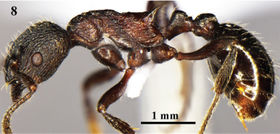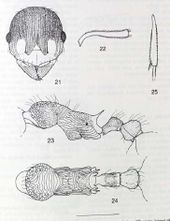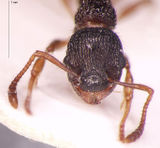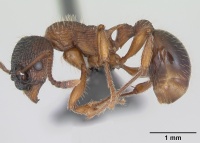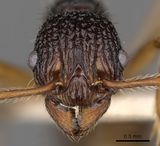Key to Myrmica of China
The key is modified from Radchenko and Elmes (2010). Any doubtful species are excluded here; Myrmica mixta is also excluded from the key because the worker caste is not well-known.
Forty-six Myrmica species are recognized from China. However, there are at least 104 species found in the surrounding regions of China which may be recorded in China in the near future, indicating that the diversity of Myrmica in China is extremely high. The Myrmica fauna of China is still poorly known, and many more species certainly remain to be found.
You may also be interested in
1
- Lateral portion of clypeus raised into a sharp ridge in front of the antennal insertions, so that the antennal sockets are distinctly separated from the clypeal surface (similar to that of Tetramorium)
- Lateral portion of clypeus not raised into a sharp ridge in front of the antennal insertions, so that the antennal sockets lay on the same level with the clypeal surface . . . . . 3
2
return to couplet #1
- Antennal scape at the bend having the same width as at its mid−length; the base of the scape having a longitudinal groove and lateral ridges . . . . . Myrmica excelsa
 Head of Myrmica sinica worker |
 Profile of Myrmica sinica worker |
- Antennal scape at the bend distinctly narrower than at its mid−length; the base of the scape without longitudinal groove and lateral ridges . . . . . Myrmica transsibirica
3
return to couplet #1
- Frontal carinae curved outward to merge with the rugae that surround the antennal socket. Antennal scape very smoothly curved at the base, not angled and without any trace of lobe or carina . . . . . 4
- Frontal carinae merging with the rugae that extend to the posterior margin, not curved outward to merge with the rugae that surround the antennal socket. Antennal scape strongly curved or gradually curved at the base, with or without a lobe, ridge or carina . . . . . 18
4
return to couplet #3
- First gastral tergite finely but distinctly longitudinally striated. Spurs on tibiae of the middle and the hind legs reduced, simple . . . . . Myrmica luteola
- First gastral tergite smooth and shiny. Spurs on tibiae of the middle and the hind legs well-developed and pectinate . . . . . 5
5
return to couplet #4
- Mesonotal dorsum partly with transverse rugae . . . . . 6
- Mesonotal dorsum with various sculpture, but never with transverse rugae . . . . . 11
6
return to couplet #5
- Lateral margins of head either without pilosity or with short (≤0.03mm) decumbent hairs; if any long erect to suberect hairs present, then restricted to the posterior margin and genae . . . . . 7
- Lateral and posterior margins of head with numerous long (≥0.07mm) erect to suberect hairs . . . . . 9
7
return to couplet #6
- Propodeal spines long, ESLI > 0.45, sides of pronotum with longitudinal rugae . . . . . Myrmica taibaiensis
- Propodeal spines shorter, ESLI < 0.41, sides of pronotum finely and densely punctate . . . . . 8
8
return to couplet #7
- Basal third of the first gastral tergite with superficial hexagonal fine sculpture. Posterior margin without any erect to suberect long hairs; dorsum of petiolar node with a distinct broad dorsal plate . . . . . Myrmica huaii
- First gastral tergite smooth and shiny; posterior margin with abundant short erect to suberect long hairs; dorsum of node quite narrowly rounded . . . . . Myrmica schulzi
9
return to couplet #6
- Head distinctly elongate, CI >1.20, suboval, with barely marked posterior corners . . . . . Myrmica heterorhytida
- Head slightly longer than broad, CI <1.15, nearly square, with distinctly marked posterior corners . . . . . 10
10
return to couplet #9
- Anterior surface of the petiole almost straight, dorsum of node broadly rounded. Mesonotal and propodeal dorsum with finer transverse rugae, number of rugae on this area >25, number of rugae between frontal carinae level the eyes>30. Gaster with very fine superficial microsculpture . . . . . Myrmica pleiorhytida
- Anterior surface of the petiole concave, dorsum of node with a distinct dorsal plate, slightly convex, posterior surface steep. Only mesonotal dorsum with fine transverse rugae, number of rugae on this area < 20, number of rugae between frontal carinae level the eyes ≤ 20. Gaster smooth and shiny . . . . . Myrmica dongi
11
return to couplet #5
- One of the largest known Myrmica species, HW >1.60, AL >2.50. Very hairy, number of standing hairs on petiolar node > 20 . . . . . Myrmica mirabilis
- Smaller species, HW < 1.25, AL < 2.30 mm. Less hairy, number of standing hairs on petiolar node < 15 . . . . . 12
12
return to couplet #11
- Masticatory margin of the mandible with 11−13 teeth . . . . . Myrmica curiosa
- Masticatory margin of the mandible with ≤ 9 teeth . . . . . 13
13
return to couplet #12
- Petiolar node with rounded dorsum, completely without a dorsal plate, node of the petiole and the postpetiole smooth, at most very finely striated. Pronotal dorsum with sinuous longitudinal rugae, never with coarse reticulation . . . . . 14
- Petiolar node with a dorsal plate developed to various extents (except for M. arisana), node of the petiole and the postpetiole with coarse sculpture and rugae; pronotal dorsum with coarse reticulation . . . . . 16
14
return to couplet #13
- Petiole and postpetiole almost smooth, with few punctures . . . . . Myrmica rubra
 Head of Myrmica rubra worker |
 Profile of Myrmica rubra worker |
- Petiole and postpetiole with rugae or dense punctures . . . . . 15
15
return to couplet #14
- Antennal scape longer (SI2 > 0.93), with more abundant suberect hairs . . . . . Myrmica bactriana
- Antennal scape shorter (SI2 < 0.91), with less abundant subdecumbent hairs . . . . . Myrmica ruzskyana
16
return to couplet #13
- Petiolar node with rounded dorsum, completely without a dorsal plate, node of petiole smooth, at most very finely striated . . . . . Myrmica arisana
- Petiolar node with a dorsal plate, node of petiole with quite coarse striated . . . . . 17
17
return to couplet #16
- Petiolar node with a distinct, sharply flattened dorsal plate, and having quite coarse, short sinuous longitudinal rugae on the lateral parts . . . . . Myrmica ruginodis
 Head of Myrmica ruginodis worker |
 Profile of Myrmica ruginodis worker |
- Dorsum of the petiolar node slightly convex, dorsal plate not sharply flattened, lateral surfaces with finer short longitudinal rugae . . . . . Myrmica kotokui
18
return to couplet #3
- Dorsum of the mesosoma entirely or partially with transverse rugae . . . . . 19
- Dorsum of the mesosoma with various sculptures, but never with transverse rugae . . . . . 27
19
return to couplet #18
- Dorsum of the mesosoma entirely with fine transverse rugae . . . . . Myrmica yani
- Dorsum of the mesosoma partially with transverse rugae . . . . . 20
20
return to couplet #19
- Lateral and posterior margins of the head with numerous long erect to suberect hairs . . . . . 21
- Lateral margins of the head either without pilosity or with short decumbent hairs; if any long erect to suberect hairs present, then restricted to the posterior margin and genae . . . . . 24
21
return to couplet #20
- Mesonotal and propodeal dorsum with finer transverse rugae, number of rugae on this area ≥ 25 . . . . . Myrmica yunnanensis
- Mesonotal and propodeal dorsum with relatively coarser transverse rugae, number of rugae on this area ≤ 20 . . . . . 22
22
return to couplet #21
- Head slightly longer than broad, CI < 1.15, nearly square, with distinctly marked posterior corners. Petiole with a stronger triangular ventral process . . . . . Myrmica mifui
- Head distinctly elongate, CI > 1.20, suboval, with barely marked posterior corners. Petiole ventral process normal . . . . . 23
23
return to couplet #22
- Petiole low, PI1 1.68, its node with elongate flattened dorsum. Body color reddish brown . . . . . Myrmica weii
- Petiole higher, PI1 < 1.55, its node with a short, slightly convex, gradually sloping posteriorly dorsum. Body color blackish brown . . . . . Myrmica multiplex
24
return to couplet #20
- Basal third of first gastral tergite densely punctate and longitudinally ruguloso−striated; this Basal third of first gastral tergite densely punctate and longitudinally rugulose-striate; this sculpture gradually petering out posteriorly, the rest of the surface of first tergite with well visible superficial hexagonal microsculpture . . . . . Myrmica sculptiventris
- Whole surface of first gastral tergite smooth . . . . . 25
25
return to couplet #24
- Head dorsum posterior to the eyes with reticulation, rest of head dorsum with longitudinal rugosity . . . . . Myrmica polyglypta
- Head dorsum posterior to the eyes with longitudinal rugosity; reticulation, if present, restricted to temples and/or posterior part of occiput . . . . . 26
26
return to couplet #25
- Rugosity on the head dorsum partly reduced. Frons level with the eyes with < 15 fine, slightly sinuous longitudinal rugae, only some of them running unbroken to the posterior margin. Propodeal dorsum with transverse rugosity. Scape longer than head width . . . . . Myrmica phalacra
- Rugosity on the head dorsum not reduced. The frons level with the eyes with > 20 longitudinal rugae that run unbroken to the posterior margin; surface between rugae very finely superficially punctate but appearing more or less shiny. Propodeal dorsum with short, slightly sinuous longitudinal rugae. Scape shorter than head width . . . . . Myrmica hlavaci
27
return to couplet #18
- Antennal scape strongly angled at the base, with horizontal lobe, or a vertical lobe (that can be inclined anteriorly), or denticles . . . . . 28
- Antennal scape gradually curved or angled at the base, never with a vertical, or inclined lobe, or denticles . . . . . 37
28
return to couplet #27
- Antennal scape strongly angled at the base, with horizontal lobe . . . . . 29
- Antennal scape strongly angled at the base, with a vertical lobe (that can be inclined anteriorly), or with denticles . . . . . 31
29
return to couplet #28
- Hairy species, petiole with more than 10 (usually with 12−20) long, thin and often curved hairs. Dorsum of the mesosoma entirely with longitudinal, slightly sinuous rugae, without reticulation; dorsum of the postpetiole with partly reduced sculptures. Anterior clypeal margin shallowly but distinctly notched medially. Spurs on the middle and the hind tibiae at least partly reduced and usually not pectinate . . . . . Myrmica vandeli
- Less hairy species, petiole with less than 10 (usually not more than 8) long, straight, thick hairs. Dorsum of the mesosoma with strong sinuous longitudinal rugae and often with reticulation; dorsum of the postpetiole with coarse sculptures. Anterior clypeal margin not notched medially. Spurs on the middle and the hind tibiae as a rule well-developed and pectinate . . . . . 30
30
return to couplet #29
- Frontal lobes less expanded, mean FLI 1.31. Antennal scape at the base with narrow horizontal ridge or at most with very small carina. Propodeal spines short (mean ESLI 0.31), not widened at the base, thin, often needle−like; metanotal groove weak or completely absent; petiolar node without dorsal plate, usually rounded, with posterior surface gradually declines to the postpetiole; sides of mesosoma with relatively coarse, regular, almost straight longitudinal rugae. Body color rather dark, brownish-red. Tibiae and tarsi with short subdecumbent hairs . . . . . Myrmica stangeana
- Frontal lobes more expanded, mean FLI > 1.40. Antennal scape at the base with more developed, but never massive, horizontal carina or lobe. Propodeal spines longer (means ESLI > 0.35), usually widened at the base (more thorn-like), never needle-like; metanotal groove well-developed, often deep; petiolar node with various shape; sides of mesosoma with less coarse sinuous longitudinal rugae. Body color lighter, usually ochreous or yellowish-red. Tibiae and tarsi with various hairs . . . . . Myrmica scabrinodis
31
return to couplet #28
- Propodeal spines thick and blunt, directed backward and upwards, and strongly curved inward; petiole with very short peduncle, anterior surface steep, meeting the dorsal one through an acute angle, so that the petiolar node appearing sharply angled in profile . . . . . Myrmica forcipata
- Propodeal spines thin and sharp apically, not curved inward; petiole with various shapes (seen in profile), but if sharply angled, then the minimum distance between the frontal carina narrower (FI < 0.32 vs > 0.35 in M. forcipata) . . . . . 2
32
return to couplet #31
- Lobe of the antennal scape forming shield−like dorsal plate along the basal surface of the scape . . . . . 33
- Lobe of the antennal scape not forming shield−like dorsal plate along the basal surface of the scape . . . . . 36
33
return to couplet #32
- Dorsum of head with sinuous longitudinal rugae, never with reticulation. Petiolar node and postpetiole densely punctuated . . . . . Myrmica sinoschencki
- Dorsum of head with reticulation at the posterior part. Petiolar node and postpetiole finely superficially punctate . . . . . 34
34
return to couplet #33
- Frontal carinae strongly curved, minimum distance between the frontal carinae narrower, FI < 0.26. Metanotal groove deep . . . . . Myrmica schencki
- Frontal carinae less curved, minimum distance between the frontal carinae wider, FI > 0.29. Metanotal groove shallow . . . . . 35
35
return to couplet #34
- Mesosoma with almost straight longitudinal rugae. Frontal lobes less extended, FLI 1.36−1.52, mean 1.41. Propodeal spines short, ESLI 0.18−0.30, mean 0.24. Body color usually dark reddish brown . . . . . Myrmica deplanata
- Mesosoma with sinuous longitudinal rugae or reticulation. Frontal lobes more extended, FLI 1.50−1.67, mean 1.60. Propodeal spines longer, ESLI 0.27−0.34, mean 0.31. Mesosoma yellowish−brown, head reddish brown, gaster dark brown . . . . . Myrmica koreana
36
return to couplet #32
- Antennal scape with small denticles or an even ridge at the base. Petiole in profile with an almost straight, steep anterior face, node with a posteriorly-inclined dorsal plate, appearing subtriangular . . . . . Myrmica saposhnikovi
- Antennal scape with small but distinct lobe at the base. Petiole in profile with concave anterior face, node with a flattened or somewhat convex dorsal plate . . . . . Myrmica eidmanni
37
return to couplet #27
- Propodeal spines long, ESLI > 0.45. Propodeal lobes pointed or blunt apically, but never rounded . . . . . 38
- Propodeal spines shorter, ESLI < 0.40. Propodeal lobes rounded apically . . . . . 48
38
return to couplet #37
- Surface between rugae on the head and the dorsal surface of the petiole and postpetiole shiny and smooth or at most very superficially micropunctate; head, mesosoma, petiole and postpetiole usually with similar coarse rugae . . . . . 39
- Surface between rugae on the petiole and postpetiole dull, always distinctly and often coarsely punctate; surface of head usually with similar punctures (except for M. angulata), rugae on dorsum of the head often noticeably finer than that on the mesosoma . . . . . 44
39
return to couplet #38
- Dorsum of head entirely with almost straight, subparallel rugae, completely lacking reticulation, more than 6 rugae between frontal carinae level with the eyes . . . . . 40
- Dorsum of head with distinctly sinuous rugae and reticulation, if reticulation not developed, less than 6 rugae between frontal carinae level with the eyes . . . . . 41
40
return to couplet #39
- Seen at magnification x l00, fine sculpture on surface of the head completely invisible. Pronotum with longitudinal rugae. Head yellow, strongly contrasting with the darker mesosoma . . . . . Myrmica ritae
- Seen at magnification × 100, surface of head weakly micropunctate. Pronotum coarsely reticulate. Head brownish red, not strongly contrasting with mesosoma . . . . . Myrmica pararitae
41
return to couplet #39
- Posterior dorsal surface of the head (from above in the level of the eyes) with coarse reticulations . . . . . 42
- Posterior dorsal surface of the head with sinuous rugae; coarse reticulations, if present, then also restricted to the posterior part . . . . . 43
42
return to couplet #41
- Frons between frontal carinae level with the eyes with only 4 coarse rugae. Petiolar node, postpetiole, and sides of mesosoma with coarse reticulation . . . . . Myrmica sinensis
- Frons between frontal carinae level with the eyes with ≥ 6 coarse rugae. Petiolar node, postpetiole and sides of mesosoma with coarse rugae . . . . . Myrmica urbanii
43
return to couplet #41
- Frons between frontal carinae level with the eyes with 4 very coarse rugae . . . . . Myrmica pulchella
- Frons between frontal carinae level with the eyes with ≥ 6 fine rugae . . . . . Myrmica serica
44
return to couplet #38
- Petiole and postpetiole with fine sculptures, distinctly contrasting with much coarser sculptures on the mesosoma . . . . . 45
- Petiole and postpetiole with coarser sculptures, similar to those on the mesosoma . . . . . 46
45
return to couplet #44
- Frontal carina extending back to behind the eyes, posterior part of the head with reticulation; posterior and lateral margins of head with long hairs; propodeal lobes projecting apically, forming long and pointed triangles; petiole and postpetiole dull, with dense punctures . . . . . Myrmica draco
- Frontal carina extending back to the posterior margin of the head, occiput without reticulation; only posterior margins of head with 0−2 long suberect hairs; propodeal lobes projecting apically, forming short and blunt triangles; petiole and postpetiole shiny, with fewer punctures . . . . . Myrmica wangi
46
return to couplet #44
- Dorsum of propodeum behind the metanotal groove with a distinct U− shaped coarse rugae; first gastral tergite with clear superficial hexagonal microsculpture . . . . . Myrmica oui
- Dorsum of propodeum behind the metanotal groove without an U−shaped coarse rugae; Gaster smooth and shiny . . . . . 47
47
return to couplet #46
- Dorsal surface of the head between rugae not punctate . . . . . Myrmica angulata
- Dorsal surface of the head between rugae dull and punctate . . . . . Myrmica poldii
























